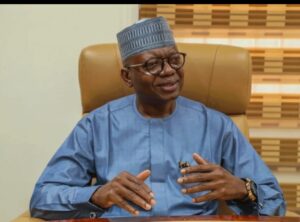Senate Commends CBN’s International Recognition, Advocates More Budgetary Reforms
 The Nigerian Senate has urged for urgent reforms in the country’s budgeting process, with a focus on improving transparency, efficiency, and alignment with national development goals.
The Nigerian Senate has urged for urgent reforms in the country’s budgeting process, with a focus on improving transparency, efficiency, and alignment with national development goals.
This call was made by Senator Mohammed Sani Musa, the Chairman of the Senate Committee on Finance, during recent discussions at the International Monetary Fund (IMF) and World Bank Spring Meetings in Washington, D.C.
Senator Musa emphasized the need to transition away from the traditional envelope budgeting system, which has been criticized for its lack of accountability and performance-based measures. He proposed adopting a Results-Based Budgeting (RBB) system, which would directly tie government spending to clear, measurable outcomes.
According to Musa, this shift would help improve fiscal discipline, boost public trust, and foster better service delivery.
In addition to advocating for budgetary reform, Senator Musa also lauded the leadership of the Central Bank of Nigeria (CBN) for its role in driving economic reforms that have garnered international recognition. He pointed to the increasing interest from global investors and the growing credibility of Nigeria’s financial management on the world stage.
He praised the leadership of Governor Olayemi Cardoso for advancing policies that have positively impacted Nigeria’s economic standing.
“The recognition we are receiving globally is a reflection of the bold economic steps being taken by the CBN, and it is crucial we build on this momentum by ensuring our budgetary system is equally transparent and performance-driven,” Musa stated.
The Senate also took a firm stance on ensuring accountability in public spending. The Committee on Finance announced that Ministries, Departments, and Agencies (MDAs) that fail to provide adequate explanations for their 2024 budget expenditures will face zero allocations in the upcoming 2025 budget. The committee has demanded that all MDAs present detailed reports of their financial activities, reinforcing the Senate’s commitment to fiscal discipline and oversight.
As Nigeria continues to navigate economic challenges, these steps are seen as critical in strengthening the nation’s financial governance and restoring public confidence in its institutions.






